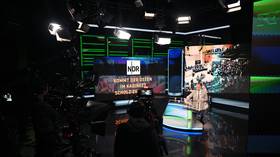Russia set to unveil retaliation for German RT DE ban

Russia is preparing to unveil a response to the banning of RT’s German-language news channel by regulators in Berlin, as part of a growing diplomatic row over media freedom. Russian Foreign Ministry spokeswoman Maria Zakharova announced that authorities would soon take action over the RT DE ban on her Telegram channel on Thursday, saying that “retaliatory measures will be announced today.”
Germany’s media regulator confirmed on Wednesday that RT DE Productions GmbH, a Berlin-headquartered production studio, should be considered a German-based broadcaster, subject to the country’s laws and regulations.
According to officials, RT DE is a “broadcaster that requires a license under Article 52 of the German Media Treaty (MStV), which was neither applied for nor granted.” In a statement, the regulator, Medienanstalten, ruled that the RT DE broadcast “should therefore be discontinued via live stream, including on the internet, via mobile and smart TV app RT News, as well as via satellite.”
RT has said it plans to appeal the decision in court, and RT DE Productions previously argued that it was solely a studio in Berlin which creates content for a broadcaster in Moscow. The TV signal had been beamed into Germany via satellite, on a valid Serbian broadcasting license.
Both Germany and Serbia are part of the European Convention on Transfrontier Television (ECTT), which, RT DE argued, allowed it to broadcast in other European countries. The German authorities, however, rejected this argument and insist it falls under their remit.
RT’s deputy editor-in-chief, Anna Belkina, has argued that the case against RT DE could be politically motivated. “It appears as if the German authorities, politicians and even media are really afraid of something, afraid of an alternative point of view that the German-speaking audience can get access to on RT DE channel,” she said on Wednesday.
The Russian Foreign Ministry said that the pressure on RT DE from Germany’s media authorities is “unacceptable.”
In her post, Zakharova hit out at the chief media freedom officer at the Organization for Security and Co-operation in Europe (OSCE) Teresa Ribeiro.
“It’s symptomatic that OSCE is silent on Germany’s decision to ban the broadcast of RT DE,” Zakharova wrote. “So it will be twice as unforgivable if Madam Ribeiro speaks out against Russian retaliatory measures that will be announced today. First, they are retaliatory. Second, if you stay silent once, who’ll believe you [now.]”
Dmitry Peskov, the Kremlin’s press secretary, told reporters on Thursday that the attacks on RT DE were “nothing but an infringement on the freedom of speech.”













